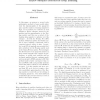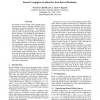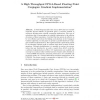138
click to vote
JMLR
2012
13 years 4 months ago
2012
In this paper, we propose a second order optimization method to learn models where both the dimensionality of the parameter space and the number of training samples is high. In ou...
125
click to vote
ICASSP
2011
IEEE
14 years 5 months ago
2011
IEEE
This paper considers linear precoding for time-varying multipleinput multiple-output (MIMO) channels. We show that linear minimum mean-squared error (LMMSE) equalization based on ...
104
click to vote
INFORMATICALT
1998
15 years 1 months ago
1998
This paper presents a parallel version of a Generalized Conjugate Gradient algorithm proposed by Liu and Story in which the search direction considers the effect of the inexact lin...
118
click to vote
IJIT
2004
15 years 3 months ago
2004
This paper reports work done to improve the modeling of complex processes when only small experimental data sets are available. Neural networks are used to capture the nonlinear un...
135
click to vote
IJCAI
2007
15 years 3 months ago
2007
We propose a novel variant of the conjugate gradient algorithm, Kernel Conjugate Gradient (KCG), designed to speed up learning for kernel machines with differentiable loss functio...
130
click to vote
DAC
2005
ACM
15 years 4 months ago
2005
ACM
This paper proposes a fast decoupling capacitance (decap) allocation and budgeting algorithm for both early stage decap estimation and later stage decap minimization in today’s ...
117
click to vote
ARC
2008
Springer
15 years 4 months ago
2008
Springer
As Field Programmable Gate Arrays (FPGAs) have reached capacities beyond millions of equivalent gates, it becomes possible to accelerate floating-point scientific computing applica...
124
click to vote
GLOBECOM
2009
IEEE
15 years 5 months ago
2009
IEEE
—This paper discusses the application of iterative versus adaptive equalizers to a Universal Mobile Telecommunications System (UMTS) High Speed Downlink Packet Access (HSDPA) rec...
132
click to vote
ICANN
2001
Springer
15 years 6 months ago
2001
Springer
The method of conjugate gradients provides a very effective way to optimize large, deterministic systems by gradient descent. In its standard form, however, it is not amenable to ...



